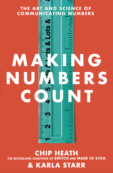In Made To Stick, we talk about situations where communicators had to make people experience something, because talking about it was inadequate. We talk about an elementary school teacher who made her students experience prejudice. We talk about how HP got its engineers to experience the value its technology could bring to Disney. We talk about how the NBA made players experience the risk of AIDS.
The WSJ’s Phred Dvorak writes about the innovative training efforts of the French food-services company Sodexho Alliance. The training mission: To inspire respect and appreciation for diversity. Don’t roll your eyes yet. You haven’t heard this one before:
TWO YEARS AGO, Rod Bond, an executive at a U.S. unit of French food-services company Sodexho Alliance SA, accompanied female colleagues to a meeting of the Women’s Food Service Forum, where he was a rare man among roughly 1,500 women.
“That’s a profound experience,” says Mr. Bond, 57 years old. It prompted him to wonder how women managers of his generation had felt when they started their careers amid a sea of men. “I can begin to feel what it must have felt like to be different,” Mr. Bond says. …
Ms. Anand [Sodexho’s Chief Diversity Officer] asked Mr. Bond to sponsor the affinity group for women employees when it formed about four years ago. Mr. Bond, who runs the Sodexho division that serves public schools, says participating in the group helped him appreciate the concerns of women employees. One of the group’s first requests was for a lactation room at headquarters, where new mothers could pump breast milk. “It’s just one of those things I’d never thought about,” says Mr. Bond.
Working with the group also made Mr. Bond more sensitive to women’s feelings, he says. Recently, he found himself annoyed by a TV comedian making jokes about divorce, all at the wife’s expense. Mr. Bond says he has also changed the social activities he plans for his colleagues, arranging excursions such as dinner cruises instead of golf outings, which he thinks appeal primarily to men.
Being the only man in a conference of women. Contributing to the plans for a lactation room. That’s the way you make the value of diversity stick.



